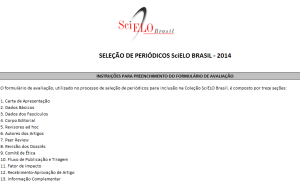By Abel L Packer and Fabiana Montanari
The SciELO program is updating the indexing criteria of SciELO Brazil as an important component of the implementation of the priority lines of action of professionalization, internationalization and strengthening the financial sustainability of the journals it indexes and publishes, with the aim of promoting an improvement in their quality, visibility and impact. The criteria are updated and applied by the SciELO Brazil Advisory Committee, which is responsible for all decisions regarding the inclusion and permanence of journals in the collection. SciELO Brazil criteria act as a reference for the collections in other countries of the SciELO Network. The current version of the criteria is available¹ on SciELO website and the new version will be announced in the second half of 2014.
This year, 2014, the SciELO program completes 16 years of regular operation and continuous advances in methodology, technologies, products and services for the development of quality journals it indexes and publishes. The SciELO 15 Years Conference, held in October 2013, promoted an extensive analysis and debate on the development and innovations that are shaping the future of scientific communication, highlighting the opportunities and challenges presented to the journals of developing and emerging countries, particularly journals indexed by SciELO Network. The new SciELO indexing criteria should contribute decisively to align the development of Brazilian journals according to the international state of the art on editing, publication and exchange of scientific information.
The SciELO indexing criteria are focused on identifying and promoting the scientific character of the journals, i.e., the predominant reporting of original research results, as well as essays and other types of reports. The peer review of manuscripts is a mandatory condition as well as the representativeness, institutional and geographical distribution of the editorial board and authors. Journals that privilege the composition of the editorial board, peer reviewers or authors from one institution or a specific geographical region are not accepted into the collection.
The production flow of journals should be as transparent and efficient as possible and it is formed by a set of specific criteria. The expectation is that in the near future all journals operate with online manuscripts management systems, which allow the monitoring of assessment by the authors and with the minimum possible time between submission date and the outcome of the evaluation. The system should provide support function to detect plagiarism, include option to charge publication fees and provide updated statistics on the number of manuscripts, immediate rejection rates as well as rejection and acceptance rates after assessment by ad hoc reviewers.
Internationalization is a key aspect in managing articles flow and decisively contributes to increase the visibility of research and, therefore, the prospect of being cited in other studies. Internationalization applies to all journals and it is measured by the presence of foreign researchers as editors, reviewers, and especially as authors. The publication in English language is a necessary – but not sufficient condition for internationalization.
Accepted manuscripts should have their texts revised both in Portuguese and in English by professional services and continuously evaluated by editors and authors. Texts in XML format will be considered original source for other formats such as HTML, PDF and ePUB, as well as for the generation of metadata exchanged with scientific information indexes and systems, for bibliometric databases and interoperability operations in general.
The continuous publication of articles, i.e., as soon as they are approved and reviewed, is a highly recommended practice to accelerate the flow of articles and maximize the exposure time for downloads and citations in SciELO and other Web-operated indexes and systems. When exclusively associated with online publication, there is no limitation on the number of articles.
Dissemination and marketing are essential elements for the development and operation of quality journals and sustainable increase in the national and international visibility. Besides the presence in the main international indexes, its implementation will take place mainly in social media. Therefore, journals should adopt their own operation strategies in social media and/or participate in cooperative strategies that SciELO is promoting through the blog SciELO in Perspective.
The scope of the SciELO program is multidisciplinary and indexing criteria as well as its current revision take into account the characteristics of each area of knowledge in setting up such criteria. Thus, for example, the minimum values for number of articles, the percentage of articles in English, average citations per paper, among others, are established by subject areas. Where necessary, the Advisory Committee establishes specific thematic committees for the analysis of all journals by discipline or subject area. This semester, specific committees for the areas of nursing, psychology and administration are ongoing. Another important aspect in applying the inclusion and permanence criteria of journals is the conditional decision with waiting time for its permanent acceptance that the Advisory Committee recurs to allow journals to meet unfulfilled criteria.
The new indexing criteria that will guide the acceptance and permanence of new journals in SciELO Brazil are being developed based on the evolution of the performance of the indexed journals and aiming to accelerate the processes of professionalization, internationalization and financial sustainability of quality journals indexed by SciELO.
Note
¹ http://www.scielo.br/avaliacao/avaliacao_en.htm (only in Portuguese)
External link
SciELO 15 Years Conference – http://www.scielo15.org/en
[Revised – July 7th, 2015]
Como citar este post [ISO 690/2010]:


















Recent Comments